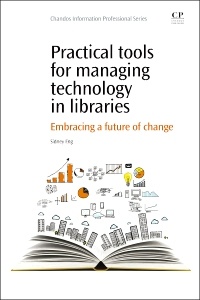Description
Practical Tools for Managing Technology in Libraries
Author: Eng Sydney
Language: English
Description
/li>Contents
/li>
Information technology has brought forth much soul searching among librarians and some of our traditional allies regarding survival or how to fulfill our mission. Practical Tools for Managing Technology in Libraries is about managing technology in small and mid-sized libraries, running a library based on management science, strategic thinking and the tools the managers or would-be managers need to do their job. Knowing what to expect can help to future proof investment and minimize risk. Technology is both a cause of and a response to the new information landscape. Digital organization, web 2.0, SharePoint intranet, information governance, and open source applications are important technology issues of the day.This title puts managing technology and managing change in a broader perspective, and provides guidance for library managers on how to seek out, sort out, coordinate and integrate individual efforts with the library’s mission goals. The first chapter introduces the book’s mission, followed by chapters on web development, web 2.0 and technology innovations. The remaining chapters address strategic thinking and future developments, with the final chapters discussing decision making in order to transform library service.
- provides a relevant design concept to illustrate its adoption
- offers examples of how libraries are able to offer new services, without a concomitant increase of staff and budget
- explores how to tackle potentially complex technology development issues
- discusses a management framework regarding technology management in libraries
- covers strategic thinking for librarians and library managers
Change and innovation in the time of uncertainty: What is our mission?, Website developments and rapid prototyping: The power of small iterations, E-Reserves, streaming video and technology innovations: Project Management guides and delivers, Web 2.0—everybody participates: A matter of radical trust or quality control, E-books, strategic thinking, and future proofing: Anticipation of future developments, Cloud computing where end users meet the experts: From the minimal to meaningful use, Teamwork and teams on the fly: Task complexities, group processes, and Appreciative Inquiry, SharePoint Intranet and collaboration:Technology to expand communication, transparency and empowerment, Leading from the middle: Decision making embedded in staff to transform library service




